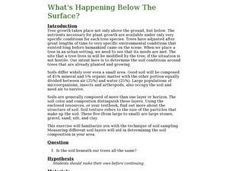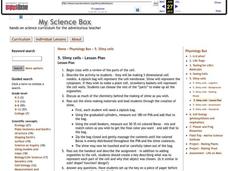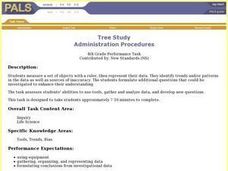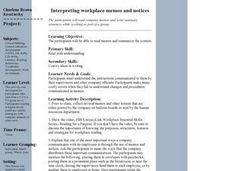Curated OER
Plant Life
Seventh graders examine different categories of plant life and their roles as producers of food and oxygen for other organisms. They study the evolution of plants from simple organisms to very complex ones. They look at the different...
Curated OER
LESSON PLANS (print version) pdf What is a Fossil?
Students can better explain how mould and cast fossils occur when they make their own cast fossils using plaster of Paris and objects such as shells, bone or even their own hand or footprint.
Curated OER
Powered Up About Electricity!
Young scholars study the process of turning coal into electricity. In this electricity lesson, students are guided by their teacher through the steps required to turn coal into electricity. Young scholars complete a worksheet answering...
Curated OER
Wappo Houses
Third graders examine the housing construction of the Wappo tribe. They research the types of materials used by other tribes and observe the types of materials used to build houses today.
Curated OER
Fungi
Students study fungi and its parts. In this exploring fungi lesson students fill out a worksheet that includes a diagram of fungi and questions.
Curated OER
Zen Gardens
Students study the design elements and symbolism of Japanese gardens through a hands-on lesson in Zen Garden design.
Curated OER
What's Happening Below The Surface?
Students determine the soil composition of soil layers in their area. They collect soil samples, calculate the percentage soil water content, analyze data, and evaluate each site for future tree growth.
Curated OER
Make Way for Wild Migrants
Learners discuss the threats facing migratory species and track the seasonal journeys of wildlife in real space and in cyberspace. Once they have gathered information from several sources, they create a portfolio to share with others...
Curated OER
Bugsicles (A Frozen Insect Larva You can Find!)
Young scholars explore how animals survive in the winder. After attending a gall-collecting field trip, students place them in a freezer. Once frozen, the young scholars open the gall flay larva and observe it as the larva revives. ...
Curated OER
Hazardous Waste
Students define technology and relate the definition to the production of electricity using nuclear energy. They also list the technologies involved and relate the use of these technologies to their effect on society in general, and...
Curated OER
Slimy cells
Students study the parts of a cell. In this chemistry lesson students complete an activity in which they make as much slime as they want.
Curated OER
The Rock Cycle
Third graders, in groups, examine soil samples with magnifying glasses. They discuss the living and non-living things they find in their soild samples.
Curated OER
Pulse
Students determine a baseline pulse rate then chart the changes in rate with exercise. They describe the changes and develop a rationale for their observations. The task assesses students' abilities to make simple observations, determine...
Curated OER
Animals Piece by Piece
Students sort organisms and objects into groups according to their parts and describe how the groups are formed.They identify body parts of animals from puzzle pieces, assemble the puzzle, and name the animal.
Curated OER
Tree Study
Students measure the lengths of provided leafs to the nearest millimeter. Students identify trends in the data as well as sourced of inaccuracy and formulate additional questions that could be investigated to enhance their understanding.
Curated OER
Mythical Animals
Students create imaginary animals by assembling pictures of body parts from pictures of real animals. This is one of three linked tasks. The others are "Who's Parts Do I Have?" and "Animals Piece by Piece."
Curated OER
Insects and Spiders
Students make either and insect or a spider using materials their teacher provides. They then draw of picture of their organism and defend why it is either a spider or an insect.
Curated OER
Creating Plants
Students create their own plants and write about them using digital cameras, AppleWorks, and the educational program Kid Pix. Emphasis is placed on the creative process and reflective writing.
Curated OER
Virus Tracker
Sixth graders will simulate the spread of a virus such as HIV through a population by "sharing" (but not drinking) the water in a plastic cup with several classmates. Although invisible, the water in a few of the cups will already be...
Curated OER
Kingdom Protista Crossword
In this crossword puzzle instructional activity, 7th graders read the definitions that relate to the protista kingdom and then complete the crossword puzzle.
Curated OER
St. Michael, Prince of the Celestial Armies
High schoolers describe this work of art as reflecting the beliefs of Mexicans in the viceregal period. They create their own sculptures in a lightweight material that shows themselves in an active pose.
Curated OER
Interpreting workplace memos and notices
Students read company memos and write summary sentences while working as part of a group.
Curated OER
DNA the Easy Way (and "Gram Stain" Without the Mess)
Students visualize DNA from cells and explain the basis and importance of the Gram-stain reaction and to perform the KOH test equivalent.
Curated OER
Understanding Our Planet's Food Web
Sixth graders, in groups, examine how humans have a tenuous position as part of an ecosystem.
Other popular searches
- Identifying Plant Structures
- Specialized Plant Structures
- Animals vs Plant Structures
- Body and Plant Structures
- Looking at Plant Structures
- Lesson Plant Structures
- Plant Structures and Functions

























